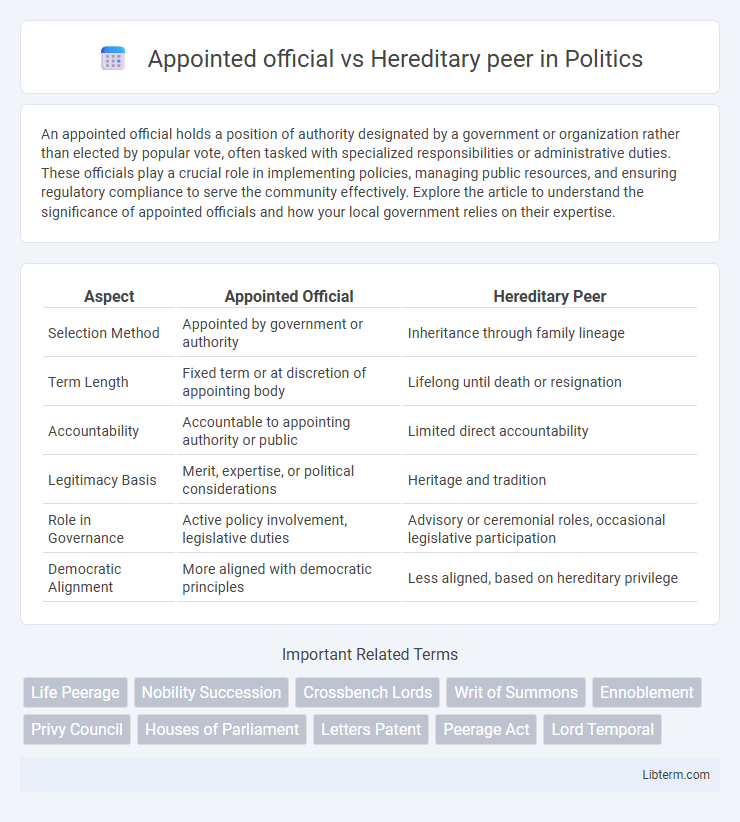An appointed official holds a position of authority designated by a government or organization rather than elected by popular vote, often tasked with specialized responsibilities or administrative duties. These officials play a crucial role in implementing policies, managing public resources, and ensuring regulatory compliance to serve the community effectively. Explore the article to understand the significance of appointed officials and how your local government relies on their expertise.
Table of Comparison
| Aspect | Appointed Official | Hereditary Peer |
|---|---|---|
| Selection Method | Appointed by government or authority | Inheritance through family lineage |
| Term Length | Fixed term or at discretion of appointing body | Lifelong until death or resignation |
| Accountability | Accountable to appointing authority or public | Limited direct accountability |
| Legitimacy Basis | Merit, expertise, or political considerations | Heritage and tradition |
| Role in Governance | Active policy involvement, legislative duties | Advisory or ceremonial roles, occasional legislative participation |
| Democratic Alignment | More aligned with democratic principles | Less aligned, based on hereditary privilege |
Definition of Appointed Officials
Appointed officials are individuals selected to hold public office through a formal appointment process, often by government executives or relevant authorities, rather than by election or inheritance. They serve specific functions within governmental or administrative bodies, carrying duties based on expertise, merit, or political trust. Unlike hereditary peers who inherit their positions through family lineage, appointed officials' roles are defined by legal or institutional frameworks and are typically temporary or subject to periodic review.
Definition of Hereditary Peers
Hereditary peers are members of the nobility who inherit their titles and seats in the House of Lords through family lineage, traditionally passed down from generation to generation. Unlike appointed officials who receive their positions based on selection by the monarch or government, hereditary peers hold their status by birthright, often linked to historical aristocratic privileges. This system has been subject to reform to reduce the automatic legislative power formerly granted to hereditary nobles.
Historical Origins and Development
Appointed officials originated from monarchs or governing bodies selecting individuals based on merit or loyalty, evolving through formalized bureaucratic systems during the Middle Ages and Renaissance. Hereditary peers stem from feudal systems where noble titles and privileges were inherited, reinforcing aristocratic power and social hierarchy throughout medieval Europe. Over time, appointed roles emphasized administrative competence, while hereditary peers retained influence through lineage and landed wealth, shaping contrasting paths in governance and social structure.
Appointment Process Explained
Appointed officials are selected through a formal nomination and vetting procedure involving government bodies or the monarch, often based on merit, expertise, or political considerations. Hereditary peers inherit their seats through lineage, with titles passed down familial lines, bypassing public or executive selection processes. Appointment for appointed officials involves transparent criteria and official approval, whereas hereditary peerage is automatically conferred by birthright within the aristocracy.
Inheritance and Hereditary Succession
Appointed officials assume positions based on selection by a governing body or authority, lacking any inheritance or hereditary succession rights. Hereditary peers inherit their titles and privileges through established lines of succession, often tracing family lineage back generations. This hereditary succession guarantees continuity of status within noble families, contrasting sharply with the meritocratic or political nature of appointments.
Roles and Responsibilities in Government
Appointed officials hold government positions based on selections by executive authorities or legislative bodies, often charged with specific administrative, regulatory, or advisory roles critical to policy implementation and public administration. Hereditary peers inherit titles and in some systems maintain legislative functions, traditionally holding seats in upper chambers like the House of Lords, where their responsibilities include reviewing legislation and providing oversight. Appointed officials usually have defined term limits and accountability measures, whereas hereditary peers' roles are tied to lineage with varying degrees of influence depending on constitutional reforms.
Representation and Accountability
Appointed officials are selected by a governing authority or through a formal process, ensuring representation based on expertise or political considerations, with direct accountability to the appointing body or electorate. Hereditary peers inherit their positions, which often limits their representational legitimacy and reduces direct accountability since their role is tied to lineage rather than public choice. The contrast in representation and accountability between appointed officials and hereditary peers highlights differences in democratic principles and governance transparency.
Pros and Cons of Appointed Officials
Appointed officials bring expertise and a merit-based selection process, ensuring skilled individuals contribute to governance without reliance on birthright. Their accountability to appointing bodies can enhance responsibility and focus on public interest, but the lack of electoral mandate may reduce democratic legitimacy and invite political bias. While hereditary peers provide historical continuity and tradition, appointed officials offer adaptability and the potential for diverse backgrounds in legislative roles.
Pros and Cons of Hereditary Peers
Hereditary peers bring deep historical continuity and a long-term perspective to governance, often possessing extensive knowledge of traditional institutions and local constituencies. However, their privilege is inherited rather than earned, raising concerns about democratic legitimacy and accountability within modern legislative bodies. The system can perpetuate social inequality and limit diversity, as positions are confined to aristocratic lineage rather than merit or public mandate.
Modern Reforms and Future Outlook
Modern reforms in the UK House of Lords have reduced the influence of hereditary peers by limiting their numbers to 92, replacing most with appointed life peers selected for expertise and public service contributions. The House of Lords Act 1999 and subsequent reforms emphasize merit-based appointments to enhance legislative effectiveness and democratic legitimacy. Future reforms aim to increase transparency, diversify membership, and possibly introduce more elected elements to balance tradition with modernization.
Appointed official Infographic

 libterm.com
libterm.com